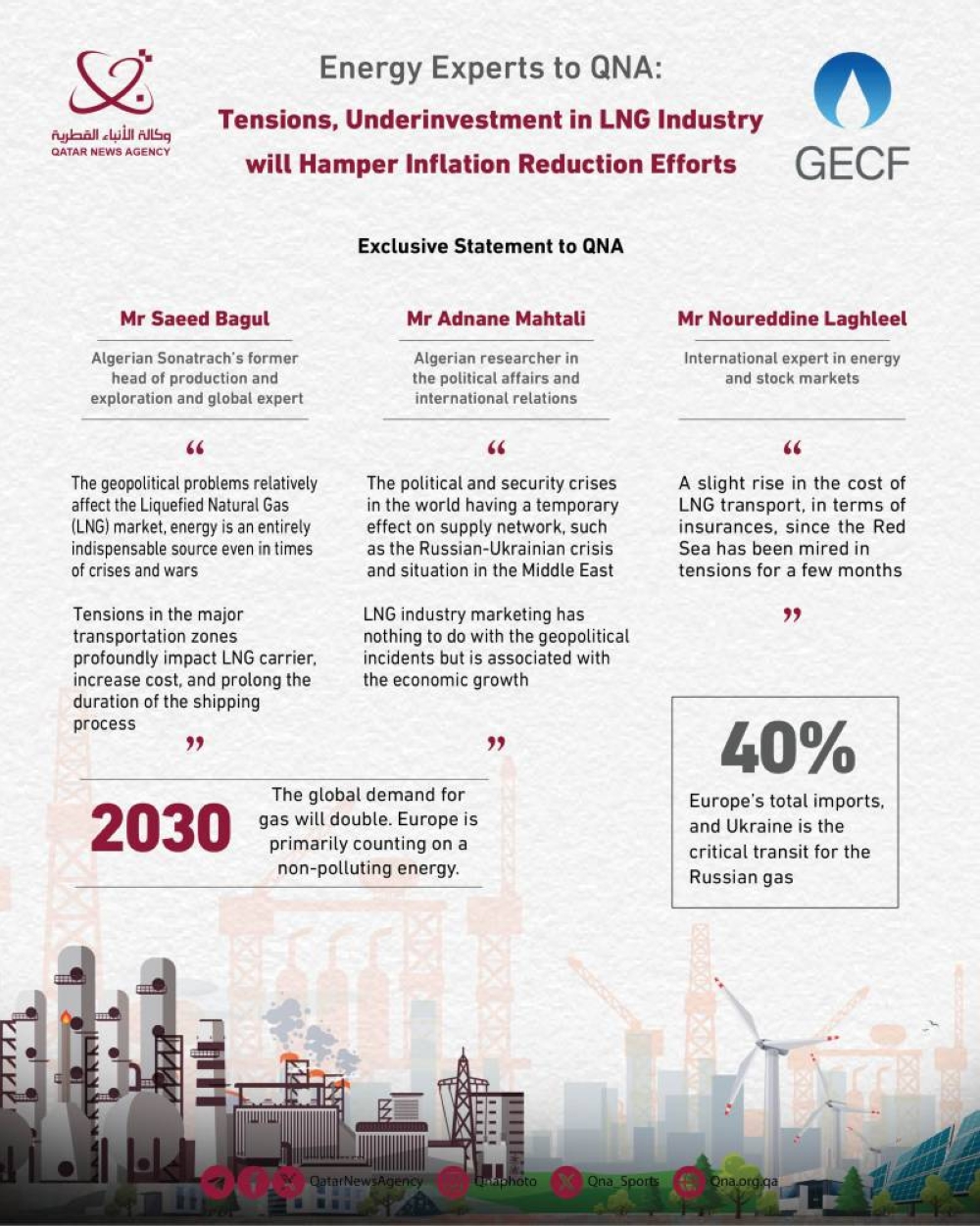Gas industry is currently facing myriad pressures given the global tensions, as the increasing severity of the situation in the Red Sea and the region would have adverse effects on the global economy leading to hyperinflation and disruption of energy supplies, according to energy experts.
International energy expert, Saeed Bagul who is also Algerian Sonatrach's former head of production and exploration told Qatar News Agency (QNA) that the geopolitical problems relatively affect the Liquefied Natural Gas (LNG) market, adding that energy is an entirely indispensable source even in times of crises and wars. He pointed out that tensions in the major transportation zones profoundly impact LNG carrier, increase cost, and prolonged duration of the shipping process, highlighting that instead of delivering energy within hundreds of kilometers in hours, it becomes thousands of kilometers in days.
Bagul predicted a revolution in energy with gas being the core element that cannot be compensated by solar and wind power, because it is a fundamental and fixed material during geopolitical crises and wars, affirming that the sole difference is the LNG prices that are certainly surging in conflict zones like the situation currently unfolding due to the Russian-Ukrainian war which triggered the demand for LNG from Europe, prompting the United States to reinforce its investments to meet this increasing demand.
Russia is the largest importer of LNG to Europe, representing 40 percent of Europe's total imports, and concurrently Ukraine is the critical transit for the Russian gas, Bagul emphasized, indicating that half of the Russian LNG exports pass through the Ukrainian territories. Consequently, the persistent conflict between the two countries raised concerns about the security of LNG supplies in Europe, Bagul said, underlining that concerns also exist about the fact that further escalation in hostilities could potentially disrupt LNG flow to the European consumers.
For his part, Algerian researcher in the political affairs and international relations Adnane Mahtali told QNA that demand on LNG is dramatically increasing, adding that the need for LNG will remain essential, for instance the outcomes of the zero-carbon energy transition adopted by the EU will never emerge before 2045, as per European experts themselves, therefore Europe primarily depends on a less-polluting energy.
The global demand for gas will double by 2030, with the political and security crises in the world having a temporary effect on supply network, such as the Russian-Ukrainian crisis and situation in the Middle East, because the latter is subject to real conditions not rumors or predictions, Mahtali highlighted, clarifying that companies today are apparently avoiding the transport areas, but these companies will shortly be acclimatized to this situation and will find solutions for that, nonetheless, there will be a slight uptick in gas prices.
Mahtali added that LNG industry marketing has nothing to do with the geopolitical incidents but is associated with the economic growth especially in major countries like China which has a profound impact on gas industry.
Notwithstanding the winter weather that hit the US market resulting in high demands for LNG, however, LNG domestic production remained flexible and helped mitigate supply price increase, in addition to increasing the US exports from LNG that supported the global supplies, Mahtali emphasized.
The report of the International Energy Agency (IEA) projected that LNG markets are braced for pressures, in terms of supply, given the continuation of the geopolitical tensions, along with LNG project delays in various territories of the world as opposed to the set timeline. The report elucidated that the escalation of the regional conflict can profoundly impact LNG supplies shipped from the Middle East.
Despite IEA projection about the potential increase in demand for LNG in 2024 by 2.5 percent, compared to growth of only 0.5 percent in 2023, however, Europe witnesses 7 percent drop in demand for LNG, and it is apparently adjusting itself to this situation through the rationalization of LNG consumption after it has been thrusted into exploring alternatives for the Russian gas through importing the higher-priced LNG from the United States.
Speaking to QNA, international expert in energy and stock markets Noureddine Laghleel said there has been a slight rise in the cost of LNG transport, in terms of insurances, since the Red Sea has been mired in tensions for a few months.
In addition, IEA anticipates the growth of LNG supplies by 3.5 percent in 2024, far less than the average growth which reached 8 percent between 2016 and 2020. It pointed out that delay in the operation of new LNG liquefaction plants, along with the inherent problems concerning the provision of LNG feed gas in the existing projects could postpone the supply growth to 2025. (QNA)
Qatar
Energy experts to QNA: Tensions, underinvestment in LNG industry will hamper inflation reduction efforts

